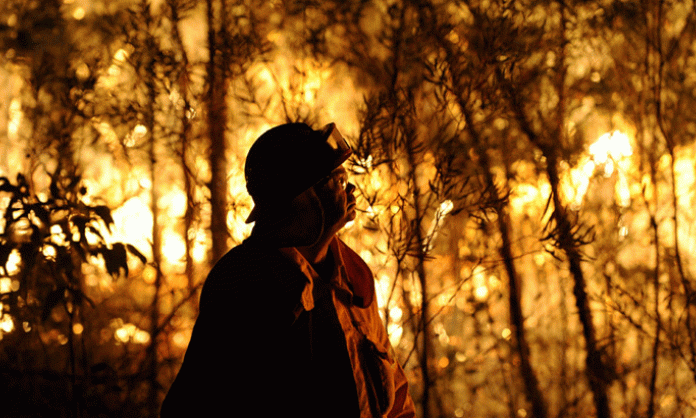Emergency services are battling to contain more than 100 fires throughout NSW. One man is dead, the result of a heart attack while defending his house, and more than 200 homes have been destroyed.
The CSIRO estimates that on average one life is lost for every 17 homes burnt down in bushfires. That the death toll at this point is not higher is testament to the work being done by firefighters and volunteers.
Containing bushfires in extreme conditions is dangerous enough. The task has been made even more difficult by the O’Farrell government’s budget cuts to fire services. The state government is ripping $64 million out of NSW Bushfire Response over four years, beginning in the 2013 financial year with $7.6 million.
Like all emergency responses, firefighting places great demands on workers. For the budget targets to be met, the cost will ultimately fall upon the firefighters, resulting in deterioration in their conditions.
The cuts have forced the closure of numerous fire stations throughout the state. The Fire Brigade Employees Union reported that fire stations in “Camden, Riverwood, Miranda, Mona Vale and Ryde were closed because of budget cuts and crews from Macquarie Fields, Ashfield, Botany and Newtown covered the areas, leaving their own fire stations vacant”.
A risky policy of placing fire stations temporarily offline has been forced upon Fire and Rescue NSW. Permanently staffed stations are being closed for the first time in history under the O’Farrell government. FBEU state secretary Jim Casey expressed concern that such a policy leaves firefighters stretched:
“Current budget cuts mean the state government is treating fire protection like a game of musical chairs, shuffling resources around the city … At some stage the music will stop and it will be left exposed, with communities around Sydney and the state the ones that will suffer.
“The FBEU is urging the NSW government to lift these budget cuts”, Casey continued, “and end the practice of temporarily closing fire stations, especially with the experts warning of a dangerous fire season ahead”.
The budget cuts also extend to the Rural Fire Services, putting further stress on volunteer firefighters to alleviate the pressure on the already short-handed permanent staff. The NSW RFS has more than 70,000 volunteers but only 1,000 salaried staff. The commitment of volunteer firefighters comes at a great individual cost.
The state has not shown the same commitment to them. Funding to the Rural Fire Service has been cut from $307m in 2010-11 to $287m in 2011-12 and will be slashed by a further 3.1 percent in 2013.
These cuts come as the leaked “second-order draft” document of the Intergovernmental Panel on Climate Change’s (IPCC) second working group has warned: “Climate change is expected to increase the number of days with very high and extreme fire weather” in Australia. Dealing with bushfires, it warns, “will become increasingly challenging”.
Meanwhile, the federal government has tightened eligibility for recovery payments for those affected by the fires.
The NSW premier has declared a state of emergency, giving emergency services the power to cut off utilities and force evacuations in response to the raging bushfire crisis.
But his government is quite prepared, as Casey puts it, to play “Russian roulette” with the state’s emergency services and people’s lives.








